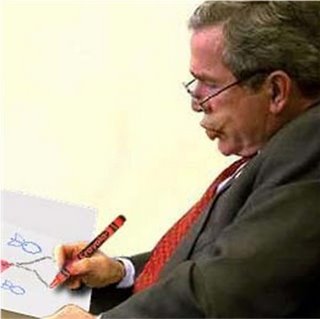
Above is what Winter should look like in the LipsYard...

...but it really looks like this. When President Bush signed legislation that overhauls some postal regulations protecting our privacy, it looked like a good thing, but then he issued a "signing statement" that declared his right to open mail under emergency conditions, contrary to existing law and contradicting the bill he had just signed.

This isn't the first time he's done that. Since taking office in 2001, President Bush has issued signing statements on more than 750 new laws, declaring that he has the power to set aside the laws when they conflict with his legal interpretation of the Constitution. The federal government is instructed to follow the statements when it enforces the laws. Here are some other examples:
The law: Justice Department officials must give reports to Congress by certain dates on how the FBI is using the USA Patriot Act to search homes and secretly seize papers.
Bush's signing statement: The president can order Justice Department officials to withhold any information from Congress if he decides it could impair national security or executive branch operations.
The law: US interrogators cannot torture prisoners or otherwise subject them to cruel, inhuman, and degrading treatment.
Bush's signing statement: The president, as commander in chief, can waive the torture ban if he decides that harsh interrogation techniques will assist in preventing terrorist attacks.
The law: When requested, scientific information ''prepared by government researchers and scientists shall be transmitted [to Congress] uncensored and without delay."
Bush's signing statement: The president can tell researchers to withhold any information from Congress if he decides its disclosure could impair foreign relations, national security, or the workings of the executive branch.
The law: The military cannot add to its files any illegally gathered intelligence, including information obtained about Americans in violation of the Fourth Amendment's protection against unreasonable searches.
Bush's signing statement: Only the president, as commander in chief, can tell the military whether or not it can use any specific piece of intelligence.
But don't all Presidents issue signing statements? Ronald Reagan issued 71 and Bill Clinton issued 105.




 Above is what Winter should look like in the LipsYard...
Above is what Winter should look like in the LipsYard... ...but it really looks like this. When President Bush signed legislation that overhauls some postal regulations protecting our privacy, it looked like a good thing, but then he issued a "signing statement" that declared his right to open mail under emergency conditions, contrary to existing law and contradicting the bill he had just signed.
...but it really looks like this. When President Bush signed legislation that overhauls some postal regulations protecting our privacy, it looked like a good thing, but then he issued a "signing statement" that declared his right to open mail under emergency conditions, contrary to existing law and contradicting the bill he had just signed. This isn't the first time he's done that. Since taking office in 2001, President Bush has issued signing statements on more than 750 new laws, declaring that he has the power to set aside the laws when they conflict with his legal interpretation of the Constitution. The federal government is instructed to follow the statements when it enforces the laws. Here are some other examples:
This isn't the first time he's done that. Since taking office in 2001, President Bush has issued signing statements on more than 750 new laws, declaring that he has the power to set aside the laws when they conflict with his legal interpretation of the Constitution. The federal government is instructed to follow the statements when it enforces the laws. Here are some other examples: